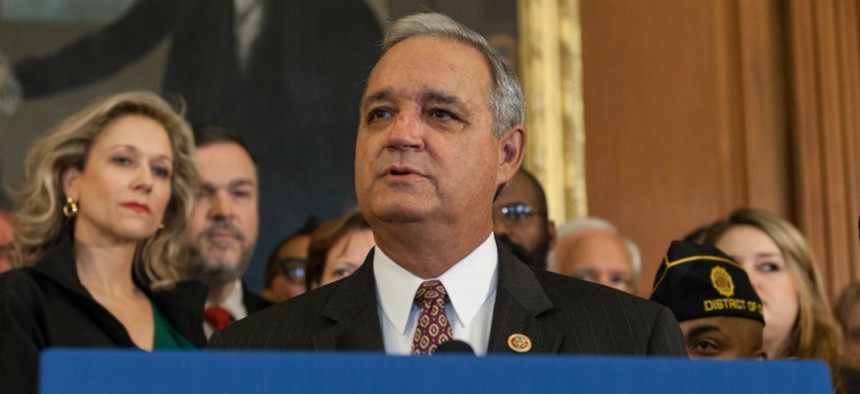
Rep. Jeff Miller, R-Fla., said the report "proves that VA’s corrosive culture extends to the highest levels of VBA leadership and must be immediately rooted out once and for all." Caleb Smith/House Speaker John Boehner
Watchdog: VA Reassigned Senior Officials to Sidestep Pay Freeze
IG also substantiates allegations related to abuse of relocation program.
Veterans Benefits Administration managers reassigned senior executives to get around a pay freeze, and also paid many of those executives unjustified relocation incentives, according to a new report from the Veterans Affairs Department’s inspector general.
VBA spent a total of about $1.8 million on 23 reassignments from fiscal 2013 to fiscal 2015, the IG found. All but two of the reassignments came with pay raises, the watchdog noted, despite an Office of Personnel Management freeze on Senior Executive Service pay from 2010 through 2013 and a separate VBA ban on bonuses in 2012 due to lack of progress addressing the backlog of outstanding disability benefits claims.
Not only did the moves involve a total of $321,000 in pay raises (amounting to an average bump of $15,286 per reassignment), but the raises did not correlate with the extent to which the employees’ job responsibilities increased, the watchdog found. For instance, one executive received a 20 percent raise for a job with less complexity, while another received a 9 percent boost for taking on more responsibility.
VBA also filled the SES vacancies created by the reassignments with employees who made as much as 22 percent more than their predecessors.
Some of the reassignments involved relocation incentives, the IG found, which are supposed to be reserved for situations where it would be challenging to fill the vacancy without an extra push. VBA paid relocation incentives totaling $140,000 for seven of the reassignments, and did not justify the incentives properly in any of the cases. In five instances, the vacancies were not announced before the relocation incentive was offered. “We determined that an agency cannot make a determination whether a position is difficult to fill if the agency does not actively search for or consider applicants for the position,” the IG said.
Adding to the price tag for the reassignments, VBA paid relocation expenses associated with 20 of 23 reassignments, the watchdog found. In 11 cases, reassigned employees also used the Appraised Value Offer program, which allows a government contractor to buy the employee’s home if it doesn’t sell in 60 days. The total tab for relocation expenses and the Appraised Value Offer program was about $1.3 million, the watchdog said.
“While the [relocation] expenses and [appraised value offer]-related expenses were allowable under federal and VA policy, we determined that VBA used moves of senior managers as a means to justify annual salary increases and used VA’s [relocation] program to pay moving expenses for these employees,” the IG stated.
When asked if the pay bumps and relocation incentives were a way to get around pay freezes and bans on bonuses, Danny Pummill, principal deputy undersecretary for benefits at VBA, told the IG: “I would say that’s probably true,” according to the report.
The report – requested by the leaders of the House and Senate Veterans’ Affairs committees – also looked at two specific controversial reassignments, one of which was highlighted in an April hearing. The IG found that the nearly $300,000 paid to relocate Diana Rubens from a job in Washington to director of the Philadelphia VA Regional Office in 2014 was “generally allowable,” though there were some smaller issues including with her use of the Appraised Value Offer program. “More importantly, the OIG concluded that Ms. Rubens inappropriately used her position of authority for personal and financial benefit when she participated personally and substantially in creating the Philadelphia VARO director vacancy and then volunteering for the vacancy,” the IG stated.
The watchdog found that another VA official – Kimberly Graves – similarly helped create a vacancy (this one at the St. Paul VA Regional Office) and then volunteered to fill it. Both Rubens and Graves took on fewer job responsibilities in their new positions but kept their previous annual salaries of $181,497 for Rubens and $173,949 for Graves, the IG noted.
“While we do not question the need to reassign some staff to manage a national network of VAROs, we concluded that VBA inappropriately used VA’s [permanent change of station] relocation program for the benefit of its SES workforce,” the IG said.
The watchdog made 12 recommendations to strengthen oversight of the permanent change of station relocation program and the VA deputy secretary agreed to make some changes, including: reviewing and improving the request and approval process for relocations and consulting with the general counsel’s office to see if it is possible to collect unjustified relocation incentives and if senior officials should be held responsible for processing payments of the incentives.
The IG referred Rubens and Graves’ actions to create and fill job openings themselves to the U.S. Attorney’s Office for the District of Columbia for possible criminal prosecution. “Formal decisions regarding the prosecutorial merit are pending,” the report said.
Rep. Jeff Miller, R-Fla., chairman of the House Veterans’ Affairs Committee, said in a statement on the report that he expects the U.S. Attorney’s Office to consider the criminal referral and “if warranted, I would expect all parties to be prosecuted to the fullest extent of the law.” He added he is looking into whether VA officials misled his committee about Rubens’ relocation during the April hearing.
“I am not surprised that the IG has confirmed our biggest fears about VBA’s relocation expenses program,” Miller stated. “The IG’s report proves that VA’s corrosive culture extends to the highest levels of VBA leadership and must be immediately rooted out once and for all. This report is simply the latest in a long line of investigations showing VA officials helping themselves instead of helping America’s veterans.”







